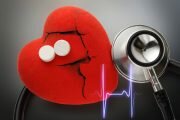Vitamin B-12 could be the key to bone health
Many women are aware that a high intake of calcium may help prevent osteoporosis. But I bet most don’t know that adding a magnesium supplement may improve the body’s ability to absorb calcium and super-boost your bone health.
Fewer women are probably aware of the emerging research that shows how a vitamin B-12 supplement may also play an important role in bone health as we age.
Previously, a three-year study compared B-12 levels with bone mineral density (BMD) in more than 80 women over the age of 65. US researchers at the University of California found that women with the lowest levels of B-12 had a significantly higher risk of bone loss and fractures compared to women with the highest levels.
At that time we noted that more research would be needed to confirm the link between B-12 and bone health, and that research has already started to roll in with two new studies published since the first of the year.
Following the links
The first study is similar to the University of California study, but the cohort was quite a bit larger.
Using data collected from the Framingham Offspring Osteoporosis Study, US researchers from Tufts University examined the association between BMD and B-12 levels in more than 2,500 men and women.
The Tufts team found that subjects of either gender who had B-12 concentrations of less than 148 pM, had significantly lower BMD on average compared to subjects with B-12 over 148 pM. (pM is a gram-fraction measurement, and 148 pM designates the cut-off point between an adequate B-12 level and B-12 deficiency.)
In their conclusions, the Tuft researchers wrote: B-12 deficiency may be an important modifiable risk factor for osteoporosis.
Meanwhile, in a recent issue of the Journal of the American Medical Association, a team of Japanese scientists noted an interesting chain of associations:
- Stroke is linked to an increased risk of hip fracture
- Stroke and fractures in the elderly are both linked with high homocysteine levels
- The combination of B-12 and folate is known to lower homocysteine
More than 620 stroke victims over the age of 65 were randomly divided into two groups. One group received 5 mg of folate and 1,000 mcg of mecobalamin (a type of B-12) daily. The other group was given a placebo. During the two-year study period, the number of falls recorded by both groups was nearly identical. But subjects in the placebo group experienced more than four times as many hip fractures as subjects in the intervention group.
Function follows form
When I asked HSI Panellist Dr Allan Spreen for his take on these studies, he started off by noting, Its wonderful to see that B-12 has been found to help bone health.
B-12 is best known for its beneficial effects on nerves, from shingles to demyelinisation (loss of nerve function) problems of all sorts. More recently, its effects on helping to lower serum homocysteine levels has put it in the limelight (though it doesn’t do the job all that well unless you add folic acid, vitamin B-6 and sometimes trimethylglycine…and maybe a little magnesium).
But these new studies show there’s even more to the nutrients range of activity.
Wouldn’t you know it would take the Japanese, however, to bother with the really good form of B-12 in their study! They used methylcobalamin instead of cyanocobalamin (at least Im assuming thats what mecobalamin is). Of the three types cyano-, hydroxo-, and methyl-, the last one is by far the best (and, unfortunately, the most expensive). I only use the cyano-type when the methyl-type is unavailable (which is often).
Dr. Spreen tells me that hes also used B-12 to address fatigue. Even if patients were confirmed anaemic (iron deficiency) and shown NOT to be B-12 deficient, I found that B-12 helped the iron deficiency correct far faster (and with less iron, which can be a double-edged sword nutrient) than with iron alone. Added folate helped even more.
Support staff
As for supplement dosage, Dr. Spreen recommends 1.6 mg per day of folate, although he personally believes that something closer to 5 mg would probably be better for those who wish to address cardiovascular problems. For B-12, he recommends 1 mg (1000 mcg) per day in sublingual form (dissolved under the tongue). And to get the most out of the B-12/folate combo, 100 mg per day of B-6 is also necessary, as well as 400-500 mg of magnesium per day (to make the B-6 more effective).
For those who are specifically trying to lower high serum homocysteine levels, Dr. Spreen suggests taking 300-500 mg per day of trimethylglycine (TMG), depending on the severity of cardiovascular status. He says, TMG is a powerful homocysteine-lowering agent, but its expensive and not always necessary for use in lowering the levels. There are some people who just don’t get a biologic response from the standard agents, folate, B-6 and B-12, so then you’d add the TMG.
Did you find this information useful?
Then why not get more expert health recommendations just like this delivered direct to your inbox?
"It is truly refreshing to read a newsletter on the topic of alternative medicine which is scientifically based and reviewed by professionals..." - Robert Sinott
We respect your privacy and will never share your details with anyone else.
Disclaimer: Bear in mind the material contained in this article is provided for information purposes only. We are not addressing anyone’s personal situation. Please consult with your own physician before acting on any recommendations contained herein.









